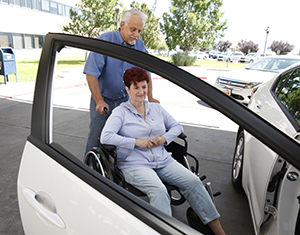Spinal Cord Injury (SCI): Your Transition Home
Leaving a hospital or rehabilitation facility to return to your home after your injury takes a lot of planning. You, your family, and your SCI care team will work together. This sheet gives you an overview of what to consider before and after your transition. Make sure to play an active role during this time. It’s important that you are fully involved in planning your move home carefully so it works best for you.

Planning your transition
Your SCI care team will help you develop your discharge plan. The goal is to help you plan for a living situation that gives you both support and independence. Think about your needs and weigh your options. You will need to make choices about how to adapt your home, transfer your routines, and stay active. With your permission, your family or other caregivers will be invited to meetings to talk about the plan. You will work together with the SCI care team to carry it out.
Things to think about
When planning your return home, consider:
-
Modifications and equipment. Think about changes to your home such as ramps and other things that will make spaces in your home easier to move around in. You may need adaptive equipment such as a hospital bed or tools to help with daily living. Your SCI care team will help you get the equipment you need.
-
Caregiving. You may need a caregiver to help with certain tasks. This could be a family member, friend, or someone from the community or an agency. The person may be paid or unpaid.
-
Your health needs. Think about the best ways to take care of your health in your living space. How will your self-care routines work best at home? How will you keep track of your medicines? How will you plan and eat meals to be sure you get the nutrition you need? Think about how these and other healthcare needs will work at home.
-
Your finances. What costs can you cover? What will you need help with? Talk with your social worker about finding resources to help pay for what you need.
-
Getting around. If you can drive, does your vehicle have the needed adaptations? If you can't drive, does your neighborhood or city have public transportation that you can use? Local paratransit services may be able to provide transport. You may decide to drive an adapted vehicle. Or you may have to arrange for a friend, family member, or other caregiver to drive you.
-
Being active. Think about how you want to spend your time after your transition home. Life is not just about self-care routines. It’s important to be active and pursue interests. Do you want to train for a job? Are there local groups you’d like to join, or a hobby you want to try? What type of fun and recreation will you do? What do you want your social life to be? Talk about your interests with your SCI care team. They can help you find resources to accomplish your goals for being social and active.
Alternative living situations
You may need more support for a period of time than you’ll be able to get while living at home. You may want to first transfer to a living situation that has on-site care. There are many types of places to live that may suit your needs. They range from facilities with 24-hour medical staffing to those with occasional assistance. Or you may go to the home of a family member or friend who can help you. A nursing facility has nurses on site around the clock that can handle many medical issues. Assisted-living centers offer help with aspects of daily life, such as housecleaning, meals, errands, and personal care. Licensed board and care homes provide services in a family home setting. Talk with your SCI care team about what type of living situation might suit you the best.
Support after transition
After your transition home, there is no need to go it alone. Many people and organizations are ready to help you. Your SCI care team will continue to help you after your discharge. Talk with family or friends about the roles they can play in helping you. Look for online and local support groups. Peer counselors are often a great help. You can also get support from outreach staff at local agencies. And you may choose to talk to a counselor. Talk with your SCI care team at any time if you need help finding more support.
Online Medical Reviewer:
Heather M Trevino BSN RNC
Online Medical Reviewer:
L Renee Watson MSN RN
Online Medical Reviewer:
Luc Jasmin MD
Date Last Reviewed:
4/1/2024
© 2000-2024 The StayWell Company, LLC. All rights reserved. This information is not intended as a substitute for professional medical care. Always follow your healthcare professional's instructions.